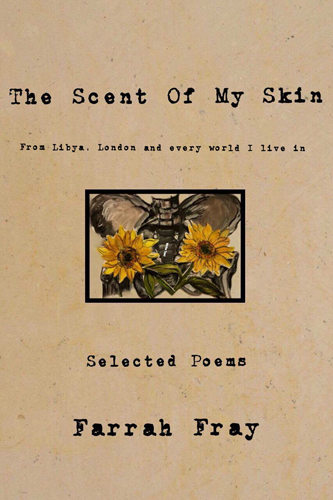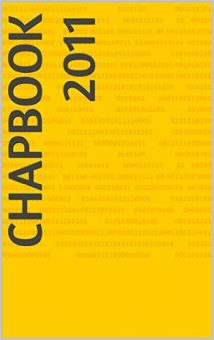There is a short poem of seven lines in The Scent Of My Skin: From Libya, London and every world I live in that embodies the metaphorical and literal edifice the poet Farrah Fray builds in her collection of fifty-two poems.
The poem “Sometimes” goes like this:
and other times
he wakes up
in the back seat
of my mind
and reminds me of
everything
Remember “Sometimes” as you read The Scent Of My Skin. The poem will then remind you that “he” carries the motif of romantic love throughout this collection, even if the poems don’t include him. You can’t shake his presence because his scent lingers just as the scent of the poet’s skin permeates the worlds Fray lives in.
What is this scent that encloses as it also expands her worlds? It consists of but is not limited to a “smell” we typically associate with “scent.” The dictionary defines scent as “a distinctive smell, especially one that is pleasant”; “perfume”; or “a trail of evidence or other signs assisting someone in search of investigation.” The Scent Of My Skin is a composite of these definitions in which the scent of the poet sets up the dramatic action in the poetry, and four motifs act as vehicles that move the drama from poem to poem. The overarching motif is that of romantic love, personified by “he” mentioned above, but Fray doesn’t spare two problematic dualities—feminism/femininity and liberation/oppression—which act as co-partners with romantic love to reveal the scent of the poet in the worlds she lives in. The fourth motif lends insight into the balance that family and friendship provide her; this world reveals the other side of romance and oppression. It is the poet’s true solace.
The Scent Of My Skin is divided into five sections in which Fray explores the above motifs. The titles of four sections are in some way associated with a food, in the literal and figurative sense. In the fifth section, the poet is concerned not with food but with the “scent” of places that undergird her journey where she has lived or visited—Libya, London, Tunisia. This fifth section also includes poems about her father and her family, poems that mitigate romantic loss in the earlier poems.
The titles and descriptions of the five sections help to clarify the mission of the motifs and expose the drama. “Section 1. Foot-traffic herbs,” for example, introduces the romantic interest as “he,” possibly the same person in the following four sections—“Milk,” “Coffee,” “Sugar,” and “Footpaths.” Although the lover/former lover appears less frequently in these sections, Fray turns our gaze onto him.
In twelve out of thirteen poems in “Section 1. “Foot-traffic herbs,” he is the focus. In the poem “I couldn’t want you anyway,” the poet is a spurned lover: “You had left months ago/but I asked everyone why you stopped caring/and some words would remind me of you./In fact, all words would remind me of you.” In the poem “Spring,” the poet tries desperately to rid her memories of him:
over and over again
until their colours slunk away,
tossed them into wells
on vacations
only to pull them back out.
. . . .
In “Dahlia” she imagines him sitting next to her in the city. The poem “Trauma” makes her recall something her English teacher told her, that the brain rehashes the traumatic event, just as she “replayed memories of you/in the morning,/wondering if you were/eating shakshouka,/or smoking a blunt.” In “Autumn” she takes walks, glad there’s no specific park that reminds her of him; still, she considers his absence a negative: “There is nowhere else I’d rather be/Than with your hands over me.”
The memories, desires, and regrets involving former relationships play out in the second section “Milk” only in one poem “Rust.” In the third section, “Coffee,” the focus returns to a past lover; however, the poems about romantic interests appear less frequently here than in the first section. In “Mocha part 1,” she remembers the first time they met it was raining outside a coffee shop and he brought the sun to her heart. Then in a turnaround, “Mocha part 2” renders “Mocha part 1” void: “And then I remembered that you maybe always talk/to women in coffee shops/There are so many places you could be right now—/One of them in another woman’s trembling arms/I stopped going to coffee shops.” Her anguish seems to deepen in this third section, particularly in the poem “The first day you left”:
I hadn’t slept for three whole nights
The first coffee spun cartwheels,
pavements multiplied.
The first day that you left
I learned warmth wasn’t from the sun,
it came from your body
and I knew clothes had to be
souvenirs of places I would never see again
. . .
In the fourth section “Sugar,” only three poems focus on a former lover, but Fray seems to have decided he is not worth the loss of her own identity. She wishes he were present in “Unwritten Hopes” and accepts his absence, but she writes him off in “Daydreams”: He could be waiting for her on the other side of her flight, but “it never materialized, needless to say,” and the poem ends, “but I always enjoy looking up at airplanes.”
Fray changes the tone and subject in “Section 2: Milk.” In “Milk” she explores the two motifs of feminism/femininity and liberation/oppression as inextricably bound in their explicit contract to oppress women. Here, milk is defined as a noun, “an opaque white fluid rich in fat and protein”; as a verb, “to exploit or defraud”; and as an adjective, “milk-white, used to symbolize feminine purity.” The drama in this section plays out as Fray concretizes the dualities of feminism/femininity and liberation/oppression. The poem “Meche,” takes center stage wherein Fray describes the procedure of highlighting a woman’s hair, a cultural mandate for a Libyan bride:
strategically placed strands skipping over
to the other side of the colour spectrum,
wrapped around bronze fingers
under a tangerine sky
but stripped of warmth,
they cascade onto women’s naked bodies
when hair is untied,
roped weathered enough
to be undone.
In a note to the reader, Fray derides the unhealthy procedure: “At weddings, it is essential for a woman and she often gets pressured into it if she doesn’t want to. But most of the time they are docile or brainwashed enough to do it.”
Fray continues the offense against the oppression of women in a series of poems that show her skill at irony. In the poem “Rallying Cry” she writes: “Though his hands might be too rough for you/you’ve just got to sleep it through/And though you might cry from the pain of his girth/nothing is harder than proving your worth.” In “Ambition,” women are used like pawns to please men: she is “tender, fair/muted like brie” and gives birth to a boy who can grow up to “bludgeon more rooms/inside another woman’s tomb.” In the poem “Women,” Fray describes women who are unsure of their identities and want to please men “by unraveling their hair/ and lightening their skin/avoiding the sun.” If only, she wishes, “May I know women who refuse to be repressed/women with curls that tumble over their breasts.”
The poet has the last word in the poem “Girl combat, London.” Here, she speaks to the empowerment of vulnerable girls in the first half of the poem:
help prevent them from becoming
caught up and
protect them
from becoming deaf,
losing the rhythm
and taste of sentences
as well as sex
Teach them that words are a martial art
that can be used to say no
as well as yes,
help them visit their tombstones
and accept
their ghosts
without pulling the trigger
Some girls are weapons
lengthy jail sentences,
projects,
waiting to be funded
others
buried, six feet under.
In tone and voice, “Girl combat, London” is diametrically opposed to the poetry of submission, and the poet tells girls and women to learn “that words are a martial art.” Stand up for yourself, she advocates; know that femininity doesn’t have to be defined by your culture. But the tone and images of the last half of the poem switch gears. Does this shift suggest violence against women if they violate the norms of a misogynistic culture? It seems that the last line could be pointing in this direction.
Throughout the first four sections of The Scent Of My Skin, Fray wrestles with the memory of former relationships; the oppression of women demanded by men and institutionalized in the culture; the question of femininity and feminism; and the camaraderie with friends like Ayah and Marwa—Marwa who Fray can’t do without. The poetry in these sections seems to say: If only foot-traffic herbs would make her unafraid of herself; if only milk would protect women from exploitation; if only coffee would enlighten what dulls the body; if only sugar would sweeten women’s hurt; if only footpaths would lead to love—if only life would cooperate.
Love is the scent that the poet carries into “Section 5: “Footpaths,” the last section of The Scent Of My Skin: From Libya, London and every world I live in. Defined as paths to walk on in the countryside and forests, on mountain ridges, and in busy cities, they can also be paths for pilgrimages, a word that describes and defines Fray’s journey. She is brave and unyielding, afraid and lonely, while facing the whiplash of a sexist culture where “boys don’t think like us.” These multiple pilgrimages are, in essence, one pilgrimage toward the time when her hope is realized: “May I know women who refuse to be repressed.”
Fray’s pilgrimage in The Scent Of My Skin: From Libya, London and every world I live in is one woman’s journey through a complex world, where failure and rejection are sureties, but as long as hope and love are a better part of the mix the poet will surely find the way.




2 comments
LOVE THE REVIEW. GOOD SELECTIONS.
Thank you, Glenn. Reading Farrah’s poetry is like stepping into the worlds she lives in, just as the title says. And when you read the poetry over and over it’s like a light illuminating the depth of her soul. So real, so true and honest and unafraid.